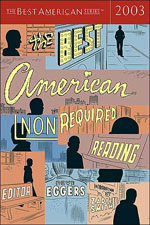[Transcribed discussion of “Speaking in Tongues,” by Zadie Smith, published in The New York Review of Books and based on a lecture given at the New York Public Library in December 2008.
In this piece, Zadie Smith argues that Obama’s potency as a president lies in his ability to move between seemingly disparate groups of people, to speak in many voices. By this she means, “Obama can do young Jewish male, black old lady from the South Side, white woman from Kansas, Kenyan elders, white Harvard nerds, black Columbia nerds, activist women, churchmen, security guards, and bank tellers.” Because Obama is “a man born and raised between opposing dogmas, between cultures, between voices,” she believes and hopes he will not be able to help “but be aware of the contingency of culture.” Like William Shakespeare, suggests Smith, Obama represents “a mass of contradictory, irresolvable voices that speak truth plurally.”]
Will: This is a great piece because this is one of the big issues that people have had and still have with Obama. Who is he? Even though he’s president, I still don’t really know who he is.
Fiona: I thought the writing was really excellent, too.
[But will anyone, the students were asked, be interested in this piece when the anthology comes out months from now, a year after the election?]
Fiona: I think so. The piece doesn’t start out with Obama, it starts out with her, and with things from her personal life. It only segues into Obama later.
Yael: I agree, and I like this one a lot, too. I don’t even think it’s that much about Obama. Sure, it’s about Obama in lots of ways, but what I mean is I think everybody’s going to find something they love about this. You don’t have to be biracial to relate to this. It’s basically about having different personalities and faces and everyone has that. It makes Obama more understandable, too.
Tanea: It really spoke to the fact that all people are hypocrites in a way. We all want to point out when someone’s not being consistent. At the same time, we aren’t that way ourselves. Everyone has different personalities in different settings.
Adrianne: And it relates to people more on a human level. It’s not such a historical piece. It’s just making one big point, that people have different voices in one self. I think this piece will fit in the book because it will relate to all people. It has universality.
Vicky: It was like listening to someone speak, which I liked. And I liked all the quotes from poems and from Shakespeare.
Eli: She brings her own original analysis to the whole thing, and it’s so impressive. The quote from Keats on page 7—about how Shakespeare was “capable of being in uncertainties, mysteries, doubts, without any irritable reaching after fact and reason”—fits Obama so well.
Molly: I agree with Adrianne. The whole piece has a very human tone. It’s introspective. It’s not really political. It looks more into why people are thinking this way or that about Obama. It gets into the origins of our obsession with him. We’re all trying to figure him out.
Will: Yeah, it seems like you can’t really know who Obama is—and it doesn’t really matter. But I think what Zadie Smith is saying is that he’s kind of the vehicle for all American thought. He can look at every different perspective.
[The students were asked if they noticed themselves, in their own lives, having to move back and forth between different identities.]
Vicky: I have to act differently when I visit family in Mexico. Not in big ways, but it’s different. They treat me differently, too, because I live here.
Yael: Definitely. My mom’s side of the family is really, really religiously Jewish. When we get together with them I have to put on a different face than when it’s just my immediate family. Or maybe it’s just that I say less around that side of the family. Anyway, I’m different around them versus how I am around my friends from suburbia, versus my friends from the city, or my family, or my teachers, or the kids I babysit. In life you have to please different people. And so you have to put on different faces. Zadie Smith is saying that’s not necessarily a bad thing. It’s human.
Subscribe to:
Post Comments (Atom)









No comments:
Post a Comment